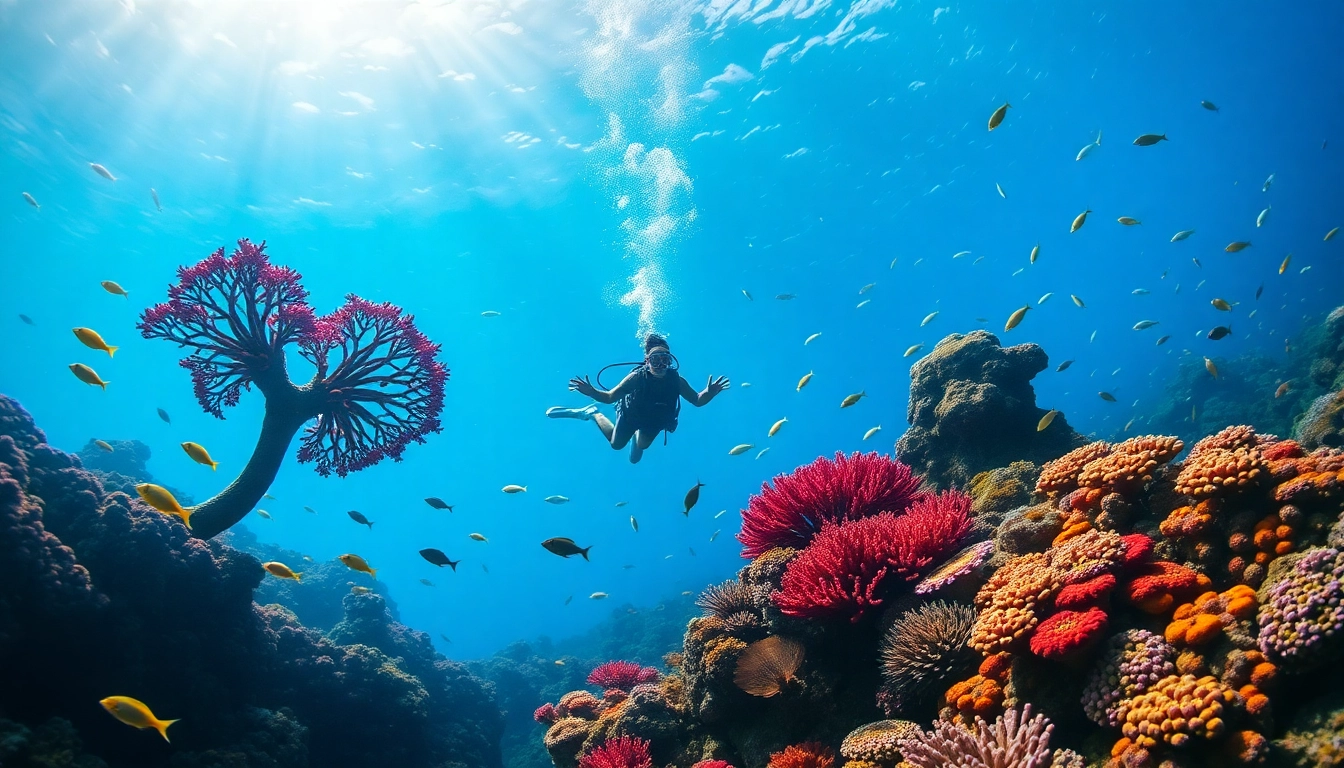What to Know Before Bali Diving
Bali, with its idyllic landscapes and rich cultural heritage, is also famed for its extraordinary diving experiences. Whether you’re a novice or an experienced diver, understanding the nuances of Bali Diving is crucial to ensuring a fulfilling underwater adventure. This guide will equip you with all the essential knowledge for a successful diving experience in Bali.
Understanding the Local Marine Environment
Bali is part of the Coral Triangle, an area recognized for its vibrant marine diversity and ecological significance. The waters around Bali teem with life, featuring oversized Manta Rays, fascinating macro critters, and vibrant coral reefs. Understanding the local marine environment helps divers appreciate their underwater surroundings and protect fragile ecosystems.
The waters of Bali host a variety of habitats ranging from submerged coral gardens to drop-offs and wrecks. Each site has its unique characteristics. For example, the biodiverse reefs at Nusa Penida attract pelagic species, while the tropical fish at Tulamben are ideal for macro photography. Awareness of these environments not only enhances your diving experience but also promotes responsible diving practices.
Required Certifications and Experience Levels
Before diving in Bali, it’s vital to have the appropriate certification. Beginners can start with introductory courses, such as Discover Scuba Diving, which allow participants to experience diving under supervision. Those seeking more extensive experiences should pursue Open Water certification. This opens the door to a myriad of dive sites throughout Bali.
For experienced divers, advanced certifications give access to deeper dives and more challenging conditions. Sites like the Liberty Wreck in Tulamben and the currents around Nusa Penida can be exhilarating yet require higher levels of skill. If you’re planning to explore these areas, consider obtaining an Advanced Open Water or Rescue Diver certification.
Best Diving Seasons in Bali
The diving seasons in Bali can significantly impact your underwater experience. Typically, the best diving occurs during the dry season, which lasts from April to October. However, the peak season for diving extends from May to November, coinciding with the calmest seas and best visibility. During this period, one can spot larger marine wildlife, including Mola Mola and various species of sharks.
While it’s possible to dive during the rainy season (November to March), potential restrictions imposed by rain and storms could affect dive trips. Specifically, visibility may drop, and strong currents can also increase, leading to more challenging conditions. Thus, when planning your Bali diving adventure, timing is essential.
Top Diving Locations in Bali Diving
Exploring Nusa Penida
Nusa Penida is one of Bali’s crown jewels for diving enthusiasts. Renowned for its stunning underwater landscapes and diverse marine species, it offers ample opportunities to encounter Manta Rays and the elusive Mola Mola. Sites such as Manta Point and Crystal Bay are particularly popular, attracting divers from all corners of the globe.
When diving at Nusa Penida, it’s essential to be prepared for strong currents. Certified divers should have experience handling such conditions to get the most out of their experience. The vibrant coral reefs and thriving pelagic life add to the allure, making Nusa Penida a must-visit diving destination.
Diving at Tulamben
Tulamben, known for the USAT Liberty shipwreck, is another iconic diving location in Bali. The wreck, situated just off the beach, is accessible to both novice and skilled divers. Over time, the wreck has become an artificial reef, providing shelter to countless species of marine life, including beautiful corals, vibrant fish, and even turtles.
The ease of access and the shallow depths make Tulamben a favorite among photographers. Divers can enjoy photographing the remarkable marine environment while exploring this unique underwater site. Overall, Tulamben is undoubtedly an essential stop on any diving itinerary in Bali.
Hidden Gems: Less Known Diving Spots
While Bali boasts popular diving sites, several lesser-known locations offer unique and enriching experiences. Areas such as Amed, Padang Bai, and Menjangan Island provide opportunities to dive away from the crowds while still enjoying stunning biodiversity and picturesque underwater landscapes.
Amed, with its black sandy beaches and vibrant coral gardens, is ideal for macro diving enthusiasts. Similarly, Menjangan Island is famous for its pristine reefs and tranquil diving conditions. These hidden gems are often less crowded, providing a more serene diving experience.
Comprehensive Guide to Bali Diving Gear
Essential Equipment for Beginners
For those just starting out in the world of diving, having the right gear is crucial to ensure safety and enjoyment. Essential equipment includes a well-fitting wetsuit, mask, snorkel, fins, and a BCD (Buoyancy Control Device). Beginners may feel overwhelmed by the variety of choices available. However, renting gear from reputable dive shops can alleviate this concern.
It’s also beneficial to ensure equipment is labeled and properly maintained. Conducting a quick inspection before diving helps in avoiding malfunctions. Additionally, participants should feel comfortable with their gear, making it imperative to try equipment before buying, as fit and functionality can significantly enhance the diving experience.
Advanced Gear for Experienced Divers
Experienced divers may require more specialized equipment to meet their adventure needs. Advanced gear could include dive computers for monitoring dive profiles, nitrox tanks for extended bottom time, and specialized diving suits for colder water.
Moreover, accessories such as underwater cameras, torches, and dive bags can enhance the overall diving experience. Before purchasing advanced gear, it’s wise to thoroughly research and read reviews. Understanding specific needs based on dive sites and personal preferences ensures smarter investment decisions.
Rental vs. Buying Equipment
One of the critical decisions for divers is whether to rent or buy gear. Renting is an excellent option for beginners or occasional divers who are exploring various dive locations. This approach allows divers to try different gear and brands without the burden of ownership.
However, avid divers may prefer to invest in personal equipment for comfort and comfort. Personal gear can be tailor-fitted and offers better hygiene protection. Regardless of the choice, prioritize renting from well-reviewed dive shops that maintain their equipment to ensure safety and quality.
Safety Tips for Bali Diving
Understanding Ocean Currents
Awareness of ocean currents is one of the key factors for safe diving. The currents around Bali can vary widely, especially in areas like Nusa Penida. Therefore, before diving, understanding current conditions is crucial.
Consulting with local diving centers and instructors can provide insights on what to expect at different dive sites. Additionally, divers should always maintain communication with their dive buddy and ensure they adhere to the dive plan, which includes protocols for managing currents.
Checklist for Safe Diving
A well-prepared checklist is essential for maintaining safety during dives. Specific items to include are:
- Check all equipment and ensure proper functioning
- Verify dive conditions including visibility and weather
- Confirm dive plan, including depth, time, and emergency protocols
- Communicate with your dive buddy and establish signals
Having a comprehensive checklist creates a safer diving experience and helps prevent potential mishaps underwater.
Emergency Procedures
In the rare event of an emergency, being familiar with procedures can save lives. It’s essential to know the signs of decompression sickness and how to react. This includes ascending slowly, using safety stops, and staying mindful of personal limits.
Each dive should start with an emergency plan, which includes identifying the closest dive center or hospital capable of treating diving emergencies. Divers should also familiarize themselves with the principles of first aid and CPR, as this knowledge could become invaluable in critical situations.
Post-Diving Activities: Enjoying Bali Above Water
Best Beaches and Relaxation Spots
After a thrilling day of diving, enjoying the best beaches in Bali can provide a perfect end to your adventure. Beaches like Seminyak, Nusa Dua, and Jimbaran Bay offer stunning sunset views coupled with pristine sands.
Various beach clubs and local eateries serve freshly prepared meals, providing the perfect opportunity to unwind and enjoy local cuisine. Relaxing by the sea allows divers to reflect on their underwater experiences and recharge for the next adventure.
Local Cuisine to Try After Diving
Exploring Balinese cuisine as a post-diving activity is rewarding. Traditional dishes such as Nasi Goreng (fried rice) and Gado-Gado (mixed vegetables with peanut sauce) are must-tries. Seafood lovers can relish fresh catch served grilled or in spicy sambal sauces.
Beyond indulging in the rich flavors, dining often centers around authenticity, offering a deeper appreciation for the local culture and community. Engaging with locals at warungs (small eateries) can enhance your experience and connection to the island.
Cultural Experiences to Enrich Your Visit
Bali is rich in cultural heritage. After your diving excursions, stepping into traditional ceremonies or visiting historic temples like Uluwatu and Tanah Lot can enhance your travel experience. Connecting with the local culture enriches your understanding of Bali and allows for wonderful storytelling memories.
Participating in Balinese dance performances or local art workshops can create lifelong memories beyond diving, fostering a deeper appreciation of both culture and nature. Balancing adventure and cultural experiences reflects the essence of what makes Bali special.


